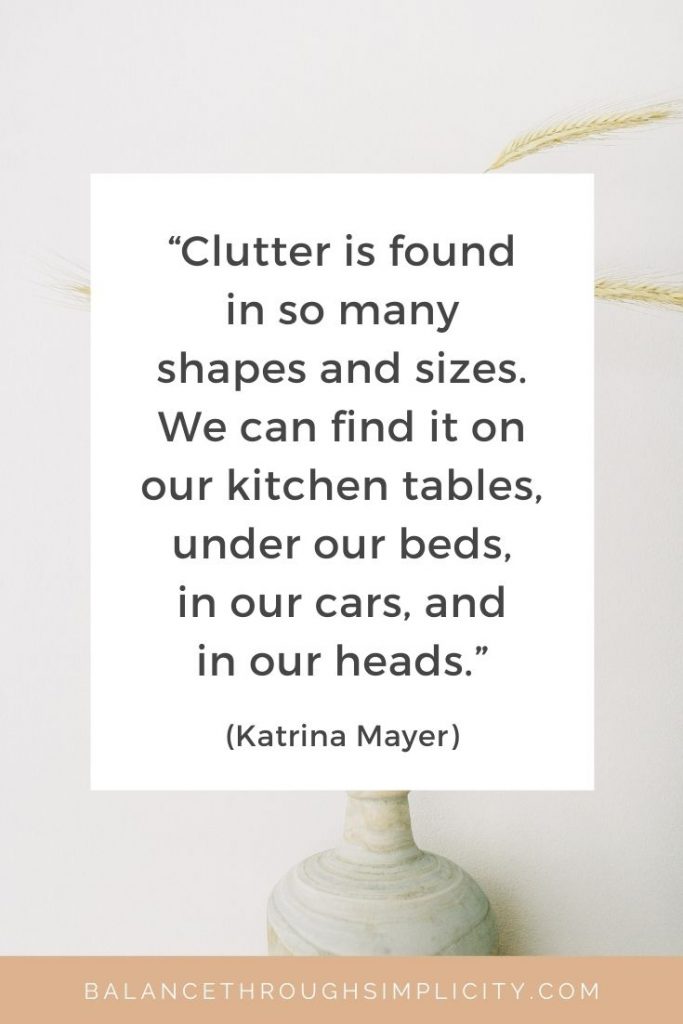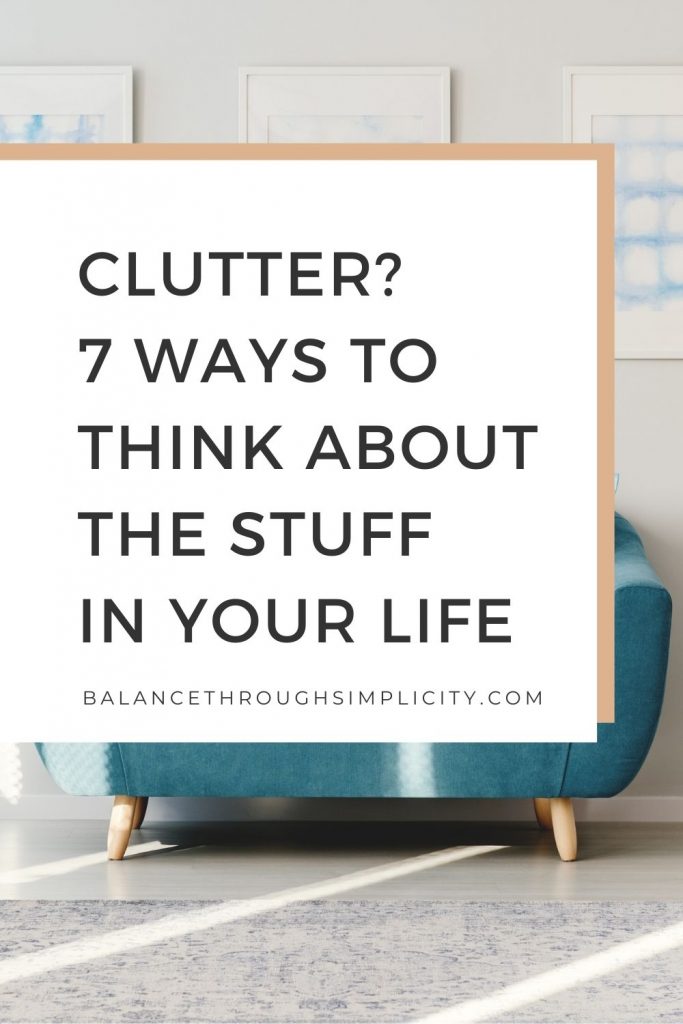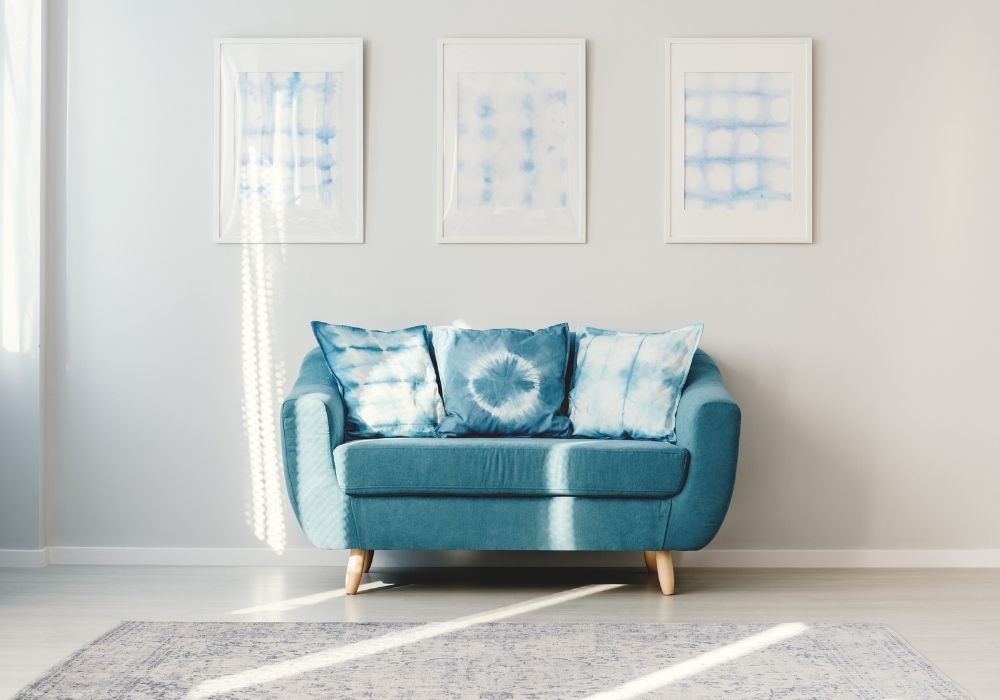WHAT IS CLUTTER AND 7 WAYS TO THINK ABOUT YOUR STUFF
Clutter means different things to different people but understanding your relationship with clutter is key to helping you clear that clutter and keep it away. Check out this post to learn more about what is clutter and 7 ways to think about your stuff.
WHAT IS CLUTTER AND 7 WAYS TO THINK ABOUT YOUR STUFF
The Collins English Dictionary defines clutter as ‘a lot of things in an untidy state, especially things that are not useful or necessary.’
Many of my courses and resources start with sections on ‘finding your why’ as I know, first hand, that unless you know why you’re doing something, it’s not likely that any changes you make will last long (however good they seem at the outset!).
Decluttering your home and simplifying your life is no exception. There will come a point where the novelty wears off, you’ll lose motivation and things slip back to the familiar status quo. That’s where ‘finding your why’ is so important.
This post is in the same vein as finding your why. It’s about asking yourself ‘what is clutter’ and what it really means to you.
I’m sharing my thoughts on what is clutter, some of the different types of clutter that you might have in your life and 7 ways to think about your stuff. It’s not an exhaustive list but I hope it helps you start to think about your own relationship with your stuff and what clutters your home and life, how and why.
THE DIFFERENT TYPES OF CLUTTER
Before we explore ways to think about the clutter and stuff in your life, I thought it might be helpful to briefly look at some of the different types of clutter that many of us come up against every day.
Physical clutter
This is clutter and stuff in your home. From too many plates and glasses to too many clothes in your wardrobe, too many toys in your child’s bedroom to too many extra sets of towels and bedlinen. Too many duplicates, too many missing pairs, too many things that you don’t need, want or particularly appreciate. Here are some tips on how to declutter the physical clutter in your home.
Time clutter
This is clutter in your schedule or filling up your days. It could be too many errands on your to do list, too many activities in your diary, saying yes to too many invitations. It could be not enough free time for yourself, unstructured free time for your kids. It could be burning the candle at both ends to complete your work. Here are some tips on how to declutter your schedule and be less busy.
Noise clutter
This is clutter that invades your quiet and calm. It could be too many lit up TV screens or music blaring that you don’t like. It could be the pings, alerts and notifications popping from your phone. It could be arguments at home because you’re stressed out and shouty with each other. It could be your phone ringing in the evening when you’re trying to unwind and get ready for bed. Here are some tips on creating a calm home.
Digital clutter
This is clutter on your computer and on your phone. It could be too many emails in your inbox, junk popping through your spam filter or newsletters that you signed up to which you no longer read. It could be millions of fuzzy photos on your phone that make finding those happy snapshot memories feel like trying to find a needle in a haystack. It could be too many apps on your phone or cables, wires and remote controls that you can’t remember what they’re for. It could be files and folders on your desktop that aren’t labelled or organised. Here are some tips on decluttering your digital life.
Mental clutter
This is clutter that takes up space in your mind. It could be negative thoughts, worries, stresses and limiting beliefs. It could be too many things to remember, or an overloaded brain that can’t focus and concentrate. It could be too many distractions or too many ideas that don’t have an outlet. It could be fears, anxieties, what if’s, perhaps and maybe’s. Here are some tips to declutter your mind.
Paper clutter
This is clutter that arrives through your letterbox as junk mail, or letters from school or bills from the electricity company. It could be newsletters, magazines and flyers. It could be receipts and bank statements, certificates and records of your child’s achievements. It could be those piles sitting on your kitchen counter waiting to be actioned, the pile of mail sitting on your hall table waiting to be sorted, even the recycling waiting to be put out. Paper clutter that needs to be dealt with, filed, shredded or thrown.
Sentimental clutter
This is clutter that brings back memories and has true emotional connection. It could be baby clothes from when your kids were little, old family photos that remind us of those we’ve lost. It could be your wedding dress or jewellery that’s been passed down through the generations. It could be artwork your child created as a toddler, old serving dishes that we remember our grandmother using for the roast on Sundays. This type of clutter is particularly difficult to part with but here are some tips on decluttering sentimental items.
Other clutter
There are plenty of other types of clutter which I’m sure you can find if you start looking around your home trying to categorise things. You could have financial clutter of too much debt and too many subscriptions for stuff you don’t want, need or use. You might have gift clutter of presents you’ve received, don’t really like but don’t feel able to part with. Clutter comes in many forms.

7 WAYS TO THINK ABOUT YOUR STUFF
To help you think about what is clutter in your home and life, here are some questions you might like to consider:
1. What do you think clutters your home and life?
Clutter is a highly personal term and it’s helpful to think about what clutter looks like for you and how it clutters your life. For example, what I think of as clutter isn’t what my husband thinks of as clutter. And so, how I declutter my stuff will be different to how my husband declutters his.
He has lots of screws, drill bits and other DIY stuff in our garage. I don’t know what most of it is, let alone how to use it and for me, it’s clutter. However, he knows how to use it and, if I want something fixed or built, he’s usually able to help me out, using the stuff that I call ‘clutter’ in the garage!
Clutter is as personal as the clothes you choose to wear or the books you like to read.
Clutter means different things to different people and this is one of the reasons why it can be difficult clearing the clutter at home when you have others living with you. People have different viewpoints, priorities, motivations and endpoints.
Your reason for wanting to clear what you feel is clutter maybe different to everyone else in your family. It’s not necessarily a bad thing but it can present extra challenges when you want to throw the clutter and, perhaps your kids or partner doesn’t.
If this sounds familiar, perhaps take a look at my post on what to do if you’re the only minimalist in the house!
2. How does clutter make you feel?
In a simple sense, clutter is also a perfectly apt and neat little term for anything that you don’t want, use, love or find some value in.
Clutter has been shown in studies to reduce our focus and concentration, distract us more and raise our stress levels.
Think about the clutter in your own home and life, or when your desk gets really messy and you can’t find anything, or you have too many tabs open on your computer screen and it all gets a bit slow. Clutter affects our bodies and brains and we can feel overwhelmed, stressed and less productive.
How does clutter make you feel? Here’s a few little journal prompts for you to think about:
- When my home feels cluttered, I feel…
- When I have lots of thoughts going round in my head, I find it difficult to…
- I feel happier when I have less to…
3. How are you keeping clutter away?
I don’t like clutter and I like to keep it out of my home, my mind, my heart and my life – as much as possible! But it has a way of creeping back when I’ve turned my back! The post dropping through the letterbox, packaging on food, the bits and bobs my kids collect, that random drawer in the kitchen where we pop things out of sight (and out of mind!), spam emails into my inbox.
Once we’ve decluttered a room, a garage, a home, it’s tempting to sit back and think we’re done, only then to find that in a week, month or year from now, we’re back to square one.
There are two things to consider here:
- Maintenance – I have lots of little tips and strategies for keeping my life as clutter-free as possible. I share a few of them here in my post on how to stay clutter-free.
- Mindset – Unless you change the way you think about stuff and living with less, then nothing will change long-term. Decluttering will be like sticking a plaster over a problem rather than addressing the root cause. Read more about the minimalist mindset over here.
4. Do you find clutter comforting?
For some, clutter can be a security blanket. We can retreat to the familiar, loved and cherished when the outside world seems scary or unwelcoming. Getting rid of the clutter is like getting rid of old friends, throwing out the past and exposing hidden insecurities that the clutter has comforted and guarded us against until now. Perhaps you have years of accumulated clutter? Or clutter from a past relationship or time in your life that you’re holding onto and not ready to part with?
I found it relatively easy to declutter my home once I’d got strategies in place. I knew why I was doing it, was ready to move forward and was incredibly motivated to change my life because I didn’t want to settle for a life half-lived.
I was certain that decluttering was the way I was going to do that.
However, I never underestimate how incredibly difficult some people can find it, either starting out or getting stuck part way through. I receive emails every week from readers who struggle in different ways. You could join my email community here or this post might help on how to declutter if you feel overwhelmed.
5. Do you hold onto clutter for emotional reasons?
Building on the point above, clutter is so much more than too many books or saucepans. Clutter can be stuff that you’ve spent years collecting, living with, looking at. It can be memories of family and times gone by, both the highs and the lows.
Yet, your clutter can be holding you back, weighing down your mind, hanging heavy on your heart or filling up your time so that there’s none left for you.
Here are a few questions to help you understand more about your relationship with the clutter in your life:
- The biggest sucks on my time and energy are…
- My home makes me feel…
- I don’t like to get rid of stuff because…
- When I part with my stuff I feel…
6. Do you add to your clutter without realising?
We can inadvertently add to our clutter without realising it and one example of this is with our shopping habits. Think about the things you’ve bought but hardly use. Some people feel that decluttering is a waste of money but I think of it differently – that buying the stuff in the first place is where the real waste of money happens.
Consider these questions:
- How many times do you buy something on impulse but don’t stop to think if you really need it?
- Do you buy things because you’re easily swayed by marketing tactics, or because your friends have it and you want it too?
- Do you shop as an emotional reaction to a situation – boredom, upset or stress, for example?
Check out this post on how to shop more mindfully and with intention.
7. How does clutter distract and remove you from what’s important?
As we’ve looked at already, studies have shown that clutter raises stress levels, hinders our ability to focus and generally confuses the mind.
I know I certainly feel calmer, more at ease, productive and present if my environment is clearer and calmer. I can find things quicker and work more efficiently in clutter-free spaces. Tidy desk, tidy mind…
Yet, clutter isn’t just about the stuff on your desk, or your home or anywhere else.
Clutter could be:
- Too many tasks on your to do list
- Too many activities in your schedule
- To many stresses and things to remember on your mind
- Too much responsibility on your shoulders
It’s like having too many internet browser tabs open all at the same time. You can’t be reading all of them at any one time. They ping for your attention, take up physical and virtual space, encourage you to flit between one tab and another, slow you down, distract you and prevent you from concentrating on that one thing you’re trying to do right now. How many tabs do you have open right now?!
At work that might be something for your boss, but at home that could be doing something for yourself or your kids, or for an aging parent, or the neighbour next door…
Clutter confuses and gets in the way of priority.
Further reading: How to define your priorities (there’s a free worksheet with the article that you can use to help you get clear on your own priorities too)

HOW TO DECLUTTER YOUR HOME AND LIFE
Clutter comes in many shapes and forms but there’s no doubt that many of us accumulate a bit (or a lot!) of clutter as we go through life.
If you’d like to start clearing your clutter, take a look at my complete guide on How to Declutter Your Home and Life for tips and ideas on how to declutter and keep that clutter away!
IN SUMMARY
As we touched on at the beginning of this article, clutter means different things to different people. The relationship we have with our stuff, how we define clutter and how it impacts our lives has an enormous part to play in how we approach clearing that clutter, and in turn, how easy or difficult we find that process.
I hope this post has helped you think a little bit about what clutter means to you. Is it:
- the physical stuff that takes up your space?
- the things you bought which are now stuffed in your cupboard?
- the baby items in the loft you don’t want to throw away?
- all the invitations you say yes to because you’re afraid what will happen if you say no?
- something more…
Understanding how you feel about your clutter and, of course, why, will help you find ways to simplify and streamline your life in the best way for you.
If you’d like more help clearing your clutter and simplifying life, check out my free Declutter Starter Kit. Just pop your details in the box below to get started right now…
DON’T MISS OUT!
I’m Antonia and on this blog I share practical inspiration to simplify your home, time and life. Follow me on Instagram, Facebook and Pinterest! You can also subscribe to Balance Through Simplicity and receive regular simplicity tips straight to your inbox for free. Make sure you never miss an article plus you’ll get a copy of my free Declutter Starter Kit as a welcome gift!

